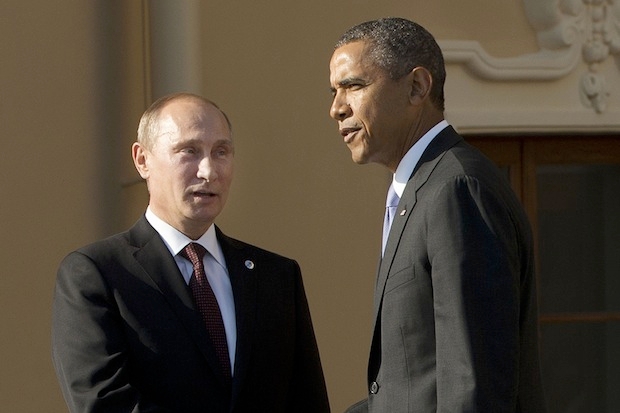One cannot legislate for a quiet world. When a former Princeton University college professor was elected president of the United States, he joked before his inauguration that ‘it would be the irony of fate if my administration had to deal chiefly with foreign affairs’. That was Woodrow Wilson, speaking in March 1913. Similarly, the Hawaiian-born Barack Obama came to office with little interest in what lay over the Atlantic. He wanted to be the Pacific president, more concerned with Asia than the squabbles of the old world.
Fate, it turned out, had other plans. This week Obama has found his visit to Europe dominated by talk of Russian militarism — and has ended up almost begging his Nato allies to do more to address the problem on their doorstep in Ukraine. Fat chance. Debt-addled Europe has neither the money nor the stomach for confrontation — it must rely, as always, on Uncle Sam. Even the more hawkish European leaders, David Cameron among them, will not go so far as to spend more money on the military. The Defence Reform Bill making its way through Parliament this week proposes to reduce our army to its smallest size since the Napoleonic wars.
Over the past two decades Britain has become a country that likes to speak in bold, even swashbuckling terms about the need to shape the world rather than be shaped by it. But to have a military capable of doing so? Well, that is another issue entirely. The army was, in effect, defeated in Basra by a ragtag group of Iran-backed Shiite militias, in whose hands we left the city and its people. The subsequent reign of jihadist terror was ended only when the Iraqi army re-invaded. This sorry episode spoke volumes about how Britain’s shrinking military is losing the ability to win.
Britain’s strategic shrinkage is a matter of policy, not just austerity. When George Osborne took office, he proposed to cut £2.5 billion from military spending but increase overseas aid by exactly the same sum. Odd priorities for a country at war. But it was an example of the coalition’s approach to defence: it wished for fewer foreign entanglements, and wanted to shrink the military in preparation for a quieter era. This was never going to work. As Trotsky once put it: you may not be interested in war, but war is often interested in you.
Vladimir Putin still thinks and acts like the KGB man he once was. He sees his Nato adversaries enfeebled and dependent on his cheap gas. Had Europe the wit to develop our substantial shale reserves, there would be no such dependence. This opportunity was missed, and Germany agreed to a Baltic pipeline to be built from Russia — which would allow Russia to supply Germany while cutting off gas to eastern Europe. When Gerhard Schröder took a retirement job with the Kremlin-controlled Gazprom, it was a sign to Putin that enemies could be bought.
Anders Fogh Rasmussen, the outgoing head of Nato, was right to warn recently that Crimea fits a pattern of Russian strategy and that its annexation ‘must be followed by increased European investment in defence’. But defence budgets are being cut all over the continent — by 11 per cent in Italy last year alone, 12 per cent in Spain and Hungary. Russia now takes defence spending more seriously than any member of Nato, having increased its military budget by 80 per cent over the past decade.
Obama will, by now, have worked out that ignoring what happens across the Atlantic is harder than he hoped. Events have dragged him into Libya and Mali. The President’s failure to think through his policy over Syria led him to specify ‘red lines’ only to do nothing when they were crossed. Such a humiliation sends a message not only to the Kremlin but to every dictator with dark ambitions: the world’s policeman is growing tired of the job and wants to retire. When shale-rich America becomes energy-independent at the end of the next decade, it may do just that.
Russia is willing to back up its words with action, while Europe and increasingly America are not. This shifts allegiances. Take arms sales: Britain has failed to sell Typhoon jets to the United Arab Emirates, while Russia recently closed a $3 billion arms deal with Egypt. Other non-aligned countries are making nice with the Kremlin — South Africa, India and Brazil have all said they’d veto any attempt to expel Russia from the G20. So the West is left with almost comically weak options. Barring Russians from the G8, Bond Street shops or the Eurovision Song Contest is hardly going to check the Kremlin’s ambitions.
Putin doesn’t need to make any more incursions into Ukraine — he has made his point. He has shown the world who is serious and who is not. The balance of power has shifted, with scarcely a shot fired. It is possible, even likely, that whoever wins the next election will impose even deeper military cuts. In Britain and the on the continent, the strategy is to pretend this isn’t happening.
It was another American president, Theodore Roosevelt, who said the secret to diplomatic success was to ‘speak softly and carry a big stick’. The bankrupt West has decided that it cannot afford a big stick any more, and is now finding it harder to make itself heard. This will make for a more dangerous world.






Comments